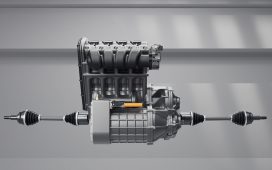It’s not often that a government decides to sabotage one of its nation’s leading industries. But this is precisely what Rishi Sunak’s flailing administration has just done to the UK car sector.
On Monday, the Tory government’s Zero Emission Mandate (ZEV) passed comfortably in the House of Commons. This new law means that manufacturers will be forced to ensure that 22 per cent of the cars they make are electric vehicles (EVs), starting on 1 January next year. This quota will rise to no less than 80 per cent in 2030, before reaching 100 per cent in 2035. Failure to meet these exacting targets will cost each manufacturer £15,000 per petrol or diesel vehicle that it makes above the quota, payable as a fine to the state.
The government claims that its ZEV gives automotive firms the ‘certainty they need to keep investing in the UK’. But all that is certain is that carmakers will be squeezed, facing penalties costing millions of pounds a day if they do not switch to EVs. This will deal a hammer blow to the UK car industry. It will force firms to manufacture cars that consumers simply do not want to buy.
The ZEV gives the lie to Sunak’s oft-repeated claim that he is taking a ‘proportionate’ approach to Net Zero. It is true that, earlier this year, he postponed the date from when every new car sold in Britain must be electric, from 2030 to 2035. But his new EV mandate is still a huge imposition. It is a state fiat, imposed directly on product markets, with all the nuance of one of Joseph Stalin’s five-year plans.
As most consumers know, EVs are expensive, limited in range and cannot easily be charged from many people’s homes. Other factors blocking the take-up of EVs include the lack of national charging infrastructure, the difficulty of repairing them and, perhaps most importantly, the absence of a market in used electric cars. Forcing carmakers to produce more EVs resolves none of these issues, but it will cost those firms dearly.
In truth, it is not really Rishi Sunak or indeed any of our elective representatives who have driven the ZEV policy. Rather, it is the brainchild of the Committee on Climate Change (CCC) – an unelected quango that advises the UK government on how to meet its climate targets.
To reach Net Zero by 2050, the CCC says we need a ‘full transition’ to EVs. But search its website and you will find it impossible to find the phrase ‘used cars’. This is despite the fact that the UK’s second-hand car market is more than four times the size of the new-car market. When it comes to electric cars, only 31,000 were sold second-hand between April and June this year – a pitiful share of the 1.8million used cars that were sold in total over the same period. So long as people cannot buy cheap, used EVs, then the transition to EVs will be going nowhere fast. Neither the CCC, Rishi Sunak nor our out-of-touch MPs seem to be aware of this.
Worryingly, the ZEV enjoyed overwhelming bipartisan support in the Commons. Only 26 MPs, all from the Tory right, rebelled against the new diktat. David Jones, member of the Tories’ Net Zero Scrutiny Group, protested that the vote on the ZEV ‘took everybody by surprise’. ‘We all assumed there was going to be a more sensible and gradual transition to Net Zero, and this has completely undone that’, he told the Telegraph.
In truth, this episode has simply revealed the gullibility and ineffectiveness of the Tory right. spiked warned several months ago that, despite Sunak’s talk of watering down the green agenda, the ZEV and similar Net Zero quotas were still coming down the track. Similarly, while Sunak made headlines by delaying a planned ban on gas boilers, boilermakers will still be forced to manufacture heat pumps – another product the public doesn’t want – to meet Whitehall’s Stalinist quotas.
What all this amounts to is a colossal act of self-harm. We are sacrificing our key industries to the mad demands of Net Zero.
James Woudhuysen is visiting professor of forecasting and innovation at London South Bank University.










